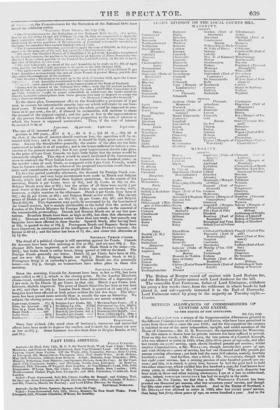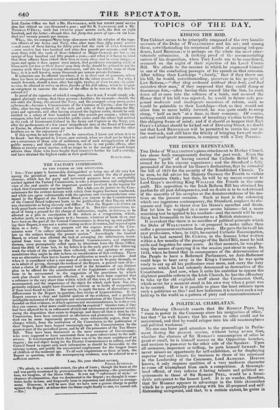RETIRED ALLOWANCES OF COMMISSIONERS OF CUSTOMS AND EXCISE. TO THE
EDITOR OF THE SPECTATOR.
8th July 1833.
Sm—I have just seen a return of the Superannuation Allowances granted to the different Commissioners of Customs and Excise, who have been permitted to retire from these offices since the year 1810; and for this exposition the country is indebted to one of the most independent, upright, and useful members of the House of Connnons,—Mr. G. R. ROBINSON, the representative for Worcester.
By this return is shown bow far private interest has been suffered to prevail. First on this list stands a Mr. BULLER, the late patron of a Cornish borough, who was allowed to retire in 1823, when Aft-three years of age only, and after but twenty-six years' service, upon eleven hundred pounds per annum; whilst another Commissioner, a Mr. Wiemasts, though seventy-two years of age, and with thirty-two years of service, has but one thousand and fifty pounds per annum retiring allowance ; yet both had the same full salaries, namely, fourteen hundred a year. And further, that a third, a Mr. STAPLETON, though with but eight years' service, has a retiring pension of nine hundred pounds per an- num; and this, it is stated, is given him, because he had the good luck to hold two other situations, which yielded him five hundred a year, for God knows how many years, in addition to this Commissionership ! Why such disparity has been made in these and other retiring allowances, I am at a loss to understand, unless, indeed, BOROUGH INFLUENCE has had its weight in the scale. Again—In the Excise, we find that a Mr. WOODBINE PARISH has been granted one thousand per annum, after but seventeen years' service, and though but fifty-nine years of age when he retired. And in the Excise of Scotland, a Mr. DouGLas was allowed to retire in 1823, after but EIGHT years' service, then being but forty-three years of age, on seven hundred a year. And in the Irish Excise Office we find a Mr. HAWTHORN' with but rum years' service also, has retired on One thousand a pear; and Sir R. LA NGRISH and a Mr. THOMAS O'DELL, with but TWELVE years' service each, the irst on eight hundrekand the latter—though then but forty-two years of aye—on six hun- dred and seventy pounds per annum. When, Sir, we compareNhese large allowances with the salaries of the supe- rior officers of our Army and Nail!, who, after More than fifty years' service —and many of them having for thirty years had the rank of FULL COLONEL —now receive but two hundred and sixty-five pounds per annum,—and that even those with the rank of Rear-Admiral or Major-General, are but iii the receipt of four hundred and fifty pounds a year,—and when it is borne in mind that these officers have risked their lives in every clime and in every danger,— again and again it does appear most unjust, that gentlemen remaining safely at home with but two or three hours' easy duty daily, should be sufiCred to tax the country with these large retiring allowances, and this too whilst some of them have, as it is well known many thousands per annum private fortunes.
If reduction can be effected anywhere, it is in these sort of pensions, where
there has been no adequate service rendered for the Salary granter!. For why, I would demand, should a man after but eight, twelve, or even twenty-six years' service, be allowed to retire on three fourths of his fidl salary, when he is quite as competent to execute the duties of the office as he was ou the day that he entered it?
In proof of the injustice of Which I complain, does it not, I would simply ask,
appear glaringly wrong, that three persons—brothers, for example—should, the one enter the Army, the second the Navy, and the youngest—very many years .afterwards—beconne a Commissioner of the Customs or Excise,—that the two elder, after having endured all the toils and risks of their professions for fifty years and upwards, and after having attained the highest ranks, should be only entitled to a salary of four hundred and fifty pounds per annum ; whilst the youngest, who had not commenced his public career until the others had arrived at the rank of Lieutenant-Colonel in the Army and Captain in the Navy, yet, after the performance of a few years' insignificant duty at the, Board of Customs or Excise, be allowed to retire on more than double the income that the elder brothers are in the enjoyment of?
If this system be not one that calls for correction, I know not where it is to
be found ; but the period is, I trust, now arrived, when we shall not be fated to see a recurrence of these acts of unfairness, and of such misapplication of the public money ; and that civilians, even the ckrhs in our public offices, after fifteen or twenty years' service, will no longer be in the receipt of Much larger salaries than those who have fought their country's battles for half a century, and have attained the highest ranks in their professions.
SenUTATOR.



















 Previous page
Previous page